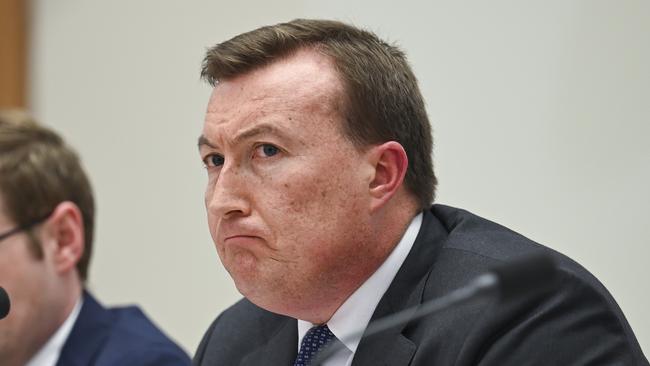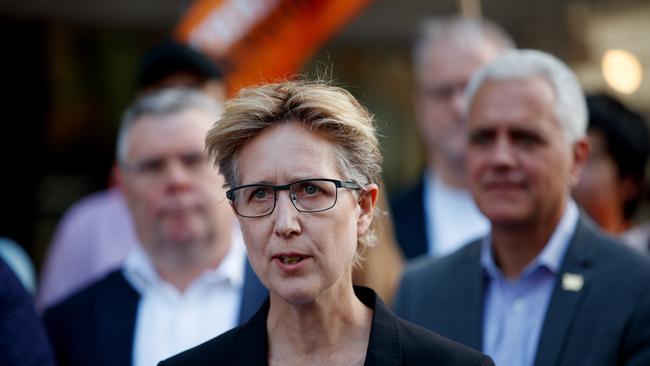BCA blasts Labor over lack of action on productivity
The nation is ‘standing on a burning platform’ and living standards will plummet unless Labor slashes taxes and industrial relations red tape, the Business Council says.

The nation is “standing on a burning platform” and living standards will plummet unless Labor slashes taxes and industrial relations red tape, the Business Council has warned, as it launched a bid to quadruple Australia’s falling productivity.
A new report from the BCA, to be released on Tuesday, will warn that Australia faces a crisis of poorer households and lower living standards without urgent action at state and federal levels to address productivity levels at their lowest in 60 years.
In the BCA’s latest broadside against the Albanese government, the peak body highlighted the government’s industrial relations changes, the energy transition and the need for corporate tax reform as three problem areas jeopardising the nation’s long-term economic health.
Both the content and the timing of the BCA’s report – just months before the next federal election is due – appears to be aimed at the Albanese government, underscoring the increasingly bad blood between it and the BCA’s big business members.
The BCA said the problems identified in the report were dampening government hopes of a pre-election interest rate cut, with productivity woes fuelling inflation. “Our existing rates of investment and our existing economic performance more broadly is not enough to sustain our quality of life into the future,” BCA chief executive Bran Black said ahead of the report’s release.
Productivity growth over the past decade, the report found, was the weakest in six decades and living standards were falling at a faster rate than in any comparable developed country.
Mr Black warned that, without changes, the gap between revenue and expenditure in Australia would continue to open up as the population aged.
“If we are to change that position, we can’t accept the status quo,” he said. “We can’t accept existing policy settings. We need to do more to drive investment into our country so that we can secure and sustain so that we can drive more taxes into the commonwealth, so that we can have more jobs. We can’t continue to simply say that where we are now is good enough to sustain this into the future. We need to be doing much more.”
The tension between the BCA and the federal government is most pronounced over IR changes that the BCA and its members – including most of the largest companies in Australia – say have swung too far in favour of unions. While the government has shown no intention of stepping back from any of those changes, the BCA said the new rules had made it much harder to do business in Australia.
“At the end of the day, all we’re arguing for is a sensible balance between union interests and business interests, and we think that what we’ve got now is a system which is fundamentally out of balance,” Mr Black said.
“That is coming through in terms of productivity figures, our figures with respect to business investment, and of course there is the feedback that I get directly from members that they are increasingly seeing that other jurisdictions offer more competitive places to invest.”
The prospect of further cuts to the US corporate tax rate once Donald Trump returns to the presidency are also set to hurt Australia’s international investment attractiveness.
Mr Trump cut the rate from 35 per cent to 21 per cent during his first term, triggering a prolonged flow of capital from Australia to the US. He has promised to cut that rate to 15 per cent when he returns to the Oval Office.
Australia, the BCA says, has the third-highest corporate tax rates in the world behind Portugal and Colombia.
“If we are to see in the United States the type of changes foreshadowed by president-elect Trump during his campaign, then we will definitely need to be looking at what we need to do to make ourselves more competitive,” Mr Black said.
Productivity is growing at an annualised rate of 0.5 per cent. The BCA says that would need to quadruple to return even to the weak levels of the past decade.

ACTU secretary Sally McManus defended the government’s IR changes, and said the business lobby was using uneven productivity growth during and post the pandemic as a reason to stop workers getting wage rises.
“Large companies don’t look at their own failings in firing productivity growth,” Ms McManus said.







To join the conversation, please log in. Don't have an account? Register
Join the conversation, you are commenting as Logout